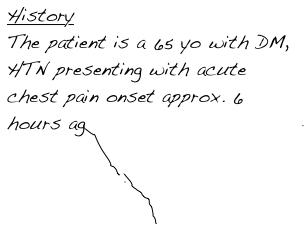Kwei Quartey's Blog, page 8
December 15, 2015
CHRISTMAS BOX SET WINNERS!
Last week I launched a new contest, a kind of geographical word quiz. The prize was the Darko Dawson four-book box set.
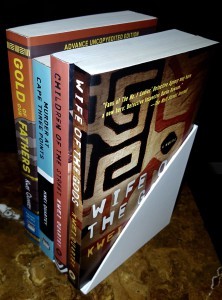
Darko Dawson Box Set containing novels 1-4
The question was:
Take the name of one of the fifty American states, drop the first and last two letters to obtain the name of one of the regional capitals in Ghana. Which state is it?
The answer is HAWAII. Drop the “HA” and “II” and you get WA, the capital of the Upper West Region of Ghana (click on map to magnify.)

Wa (uppermost left) is the capital of the Upper West Region, which is very hot and arid (click on map to magnify)
Readers jumped on it right away, and the first three to make my inbox were the winners. It was a truly international trio:
1. Asaaba M (Canada)
2. Corrine E (UK)
3. Nino S (Croatia)
Congratulations to them for getting the answer in record time.
It turns out that there are quite a few geographical word puzzles connecting Ghana and the US. Look out for another one in early 2016 and a chance to win the brand new hardcover edition of GOLD OF OUR FATHERS.
December 6, 2015
CHRISTMAS BOX SET
Last week, six smart people won a Darko Dawson Box Set for correctly answering one of two questions in my Cerebral Detective post. These were the questions:
#1. Livor mortis, a term in forensic pathology, is
A. A distinct cherry red color seen in the liver of a murder victim several hours after death.
B. Rigidity of the body after death.
C. Unlikely to occur in outer space.
D. The blanching of the skin in a murder victim found lying in the prone position.
E. Most pronounced in dark-skinned individuals.
(Correct answer is C: Livor mortis, a settling of the blood in the lower (dependent) portion of the body, depends on gravitational pull, which is erased [for the most part] in outer space)
#2. Or if that makes you a little queasy and you’d like to try your hand at something a little less graphic, solve the following puzzle:
Two Los Angeles cops, Eddie and Joe, are taking a break at a Dunkin’ Donuts while watching traffic and pedestrians go by. They spot a young woman on the other side of the street waiting to cross. She’s wearing a hat, a sleeveless coral chiffon blouse, a black skirt, and scarlet stiletto heels. Her hair is black and flows past her shoulders. Her fine gold necklace glints in the sunlight as she hurries across the street. Because she did this between two adjacent intersections that both have traffic lights, she has committed “jaywalking,” a violation of the California Vehicle Code.
“If you weren’t so busy munching on that strawberry-filled donut,” Joe says to Eddie, “would you go out and give her a ticket?”
“Well, maybe I’d give her a break if she was from out of state,” Eddie replies.
“I can tell you right now that she’s not only from out of state,” Joe declares, “she’s from another country.”
“Why do you say that?” Eddie asks. “Do you know the lady?”
“Never seen her before in my life,” Joe says, “but I wouldn’t be surprised if she’s recently arrived from Australia or the UK.”
What did Joe notice that makes him so sure?
In Australia, the UK, Republic of South Africa and some other countries, cars drive on the left-hand side, while in the USA and most of the rest of the world, driving is on the right. As a result, there’s a tendency to look the wrong way when, as in this example, a person from a left-side driving country arrives in a right-side one, and vice versa. On many streets in the UK, there’s a reminder to tourists to look right first.

Darko Dawson Box Set containing novels 1-4
And now, to win a lovely Darko Dawson Box Set just in time for the gift-giving season, I have a new contest for you to try your hand at. Aspiring to be like the great puzzle master Will Shortz, whose puzzles I listen to every Sunday (Weekend Edition Sunday hosted by the effervescent Rachel Martin), I decided to do a geographical word puzzle this time (and Will and Rachel are welcome to give it a go as well, *smile*.)
The first three correct responses in my inbox before Thursday December 10, 2015 will win the box set. Time is limited in order that the set can arrive by Christmastime (at least in the US. It won’t make it for overseas countries.)
The set includes a galley copy of the April 2016 novel GOLD OF OUR FATHERS, that is, a version of the novel that still needs editing before the final release version. Some readers like galleys as collectors’ items and/or possible future valued pieces. Very few readers get their hands on a galley copy, which is often reserved only for book reviewers.
Now on to the challenge:
Take the name of one of the fifty American states, drop the first and last two letters to obtain the name of one of the regional capitals in Ghana. Which state is it?
November 26, 2015
THE TECH AGE: Lead Us Not Into Distraction
With smartphones, laptops, tablets and the like, we feel a need to be constantly connected to the Internet, or to something or someone. Have you ever accidentally left your phone at home? In utter panic, you break into a cold sweat. Your lifeline has been cut.
Presumably with a smartphone, you are in perpetual contact with the news, your friends, family, your loved ones, your not-so-loved ones, and even people you don’t know and have no real interest in meeting. You can follow people or friend them (btw, friend as a verb is apparently not a Facebook invention), post stuff to Twitter, FB, Snapchat, Instagram etc. etc., search online for stuff, shop, buy stuff, watch videos, vines, gifs, and stuff. Our phones may be smart, but I don’t think they’re making us any smarter or more efficient. I fear they might actually be making us stupider, and I’m convinced it’s all just one Big Distraction.
Creative writing while distracted
This morning, while supposedly writing this post, between 8:15 and 9:00 I managed to put down only the above two lines: “Our phones may be smart, but I don’t think they’re making us any smarter or more efficient. I fear they might actually be making us stupider, and I’m convinced it’s all just one Big Distraction.” During that interval, I was responding to texts and emails, one of which was a Black Friday/Thursday promo thingy. So I spent some time looking at those deals and bought a couple things. Then I tried to get back to writing the post, but on the way to shutterstock.com for stock photos, I read a couple of articles on bbc.com. Trump mocks disabled reporter. Really? Not surprising. Why did I even bother to read the article? Meanwhile, my phone buzzes every minute when there’s a Twitter post. What’s this Revolution Radio that posts every 4 minutes? I have to unfollow them. Which reminds me, I didn’t post on Twitter yet today. Another couple of emails, one from LA Fitness warning me to update my payment information or become persona non grata. Let me take care of that now. Hmm, Revolution Radio still posting. Now I have to actually block them…Email from KPCC, Happy Thanksgiving. That’s nice, but I need to get back to my post. And to the 5th Darko novel I’m working on, Death By His Grace. I absolutely, seriously must write a few pages today. For that, I will use a nifty app called Freedom, which disconnects me from everything for a period of my choosing…okay, you know what, Twitter? I’m uninstalling you. This is ridiculous. Now, where was I?
Working while distracted
Stroll through the average workplace and observe how many people are Internet surfing on their desktops and/or texting/streaming on their phones. Sure, you can multi-task at work and get things done by the end of the day, right? You’ve got an agile mind, right? Unfortunately, multi-tasking might be doing more harm than good, no matter what your teenager says.
Distracted socializing
Ever chat with someone while s/he is glued to his/her phone screen? Actually, almost everyone with a phone has done this at some point. Watch friends or family at a table in a coffee shop and you’ll see it. The other day I passed a cafe where a man and his eight (or so) year old son were seated at a sidewalk table. The dad was texting away and paying no attention to his boy. None of my business, I suppose, but it seemed like a lost opportunity for this man to bond with his son. More hilariously, I was once on a train on the way to Florence where four Italian friends in facing seats were laughing and talking–but not with each other. They were all on their phones.
Walking while distracted
When we text while walking (TWW) our attention to our surroundings becomes severely curtailed.
Pratfalls might be amusing to watch online,
but TWW is truly hazardous and invariably embarrassing.
Distracted driving
Texting while driving (TWD) is the ultimate danger in distracted human activity. According to one website, the maximum amount of time one can look away from the road while driving is about two seconds, but five seconds is about the minimal time one takes to perform a text. In that time at 55 mph, you will cover the length of a football field without looking at the road. The results can be terrible to lethal.
And now I must get back to writing my novel, and you, having spent more precious moments of your life on this post, can get back to whatever else you were doing on the Internet.
November 11, 2015
The 100-Page Threshold
I am writing my novel DEATH BY HIS GRACE (release 2017) and it is going agonizingly slowly. You see, there’s this 100-page threshold for me whenever I write my novels before which it is a tortoise walk. After that point, things start to move a lot faster. By the way, I love tortoises, hehe.

Desert Tortoise (Photo: Cameron Rognan)
Cheetahs are nice too.

Cheetah running at 70-80 mph (phplinkdirectory picture)
Thing is, they can’t sustain that blistering speed for more than a few seconds, so draw whatever conclusions you may from that. I’d like to be somewhere between the tortoise and the cheetah. Maybe 60% cheetah, 40% tortoise.
After page 100, maybe I will. I’m at page 50, so I’d better get crackin’.
September 26, 2015
GOLD OF OUR FATHERS–DREAM TEAM “CHARACTORS”
CHARACTER + ACTOR = “CHARACTOR”
A sketch of the main characters in the fourth Darko Dawson novel Gold Of Our Fathers (“GOOF”), coming out Spring 2016. Next to each sketch is a picture of my dream actor to play that role. What are your own casting choices? Tweet them to https://twitter.com/Kwei_Quartey, using hashtag #GoldOfOurFathers, or leave a comment on my FB page, https://www.facebook.com/kquartey
Chief Inspector Darko Dawson
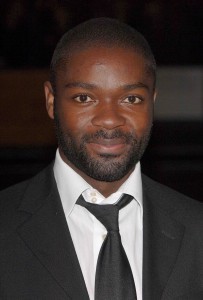
David Oyelowo (blogs.indiewire.com)
Passionate father and husband, synesthete Darko is dedicated but not enslaved to his work as a detective. He stops at nothing to find whodunit–and how. His Achilles’ Heel is marijuana. Can he beat the habit? He wants to, but it’s tough. In GOOF he’s up against some tough challenges that might send him spiralling out of control . . .
Christine Dawson

Lupita Nyong’o (Kirk McKoy/LATimes)
Christine, like so many other working mothers, is a multi-tasker who keeps a close but pragmatic watch over her husband and two young sons. She has contributed to Darko’s solving of several cases and plays an important role this time around in GOOF. She and Darko have an instinctive understanding of and an abiding love for each other.
Hosiah Dawson

Miles Brown (famousbirthdays.com)
A plucky, irrepressible kid with a huge smile, Hosiah has been through a lot with his congenital heart disease. He idolizes and adores his dad. In turn, Darko would do anything for his boy, for whom he has a deep love.
Sly Dawson

Abraham Attah (Getty Images)
Adopted by Darko and Christine, Sly was abandoned on the streets of Accra by his reprehensible uncle. Tough and more streetwise than Hosiah, Sly is rapidly growing up into a teen, and is very protective of his younger brother.
Detective Inspector Philip Chikata
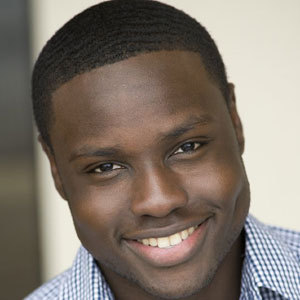
Dayo Okeniyi (hgfiresidechat.com)
Chikata is Darko’s junior partner. A heartbreaker described in Quartey’s novels as “impossibly handsome,” he’s recently joined the Ghana Police Service’s elite Panther Unit, a special forces outfit whose men are “fit, fast, and fierce.” Nephew of one of the highest-ranking officers, he was once a spoiled brat who has now matured into his own as a detective. In GOOF, he’s an indispensable sidekick to Darko.
Gifty
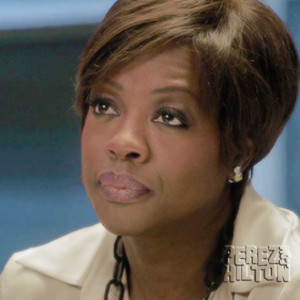
Viola Davis (perezhilton.com)
Christine’s mother-in-law can be a thorn in Darko’s side. There’s a constant tension between the two, Gifty often barely disguising her disdain for Darko’s profession, since she had always dreamed of her daughter marrying a doctor.
GOLD OF OUR FATHERS–DREAM TEAM CHARACTORS
CHARACTER + ACTOR = CHARACTOR
A sketch of the main characters in the fourth Darko Dawson novel Gold Of Our Fathers (“GOOF”), coming our Spring 2016. Next to each sketch is a picture of my dream actor to play that role. What are your own casting choices? Tweet them to https://twitter.com/Kwei_Quartey, using hashtag #GoldOfOurFathers, or leave a comment on my FB page, https://www.facebook.com/kquartey
Chief Inspector Darko Dawson

David Oyelowo (blogs.indiewire.com)
Passionate father and husband, synesthete Darko is dedicated but not enslaved to his work as a detective. He stops at nothing to find whodunit–and how. His Achilles’ Heel is marijuana. Can he beat the habit? He wants to, but it’s tough. In GOOF he’s up against some tough challenges that might send him spiralling out of control . . .
Christine Dawson

Lupita Nyong’o (Kirk McKoy/LATimes)
Christine, like so many other working mothers, is a multi-tasker who keeps a close but pragmatic watch over her husband and two young sons. She has contributed to Darko’s solving of several cases and plays an important role this time around in GOOF. She and Darko have an instinctive understanding of and an abiding love for each other.
Hosiah Dawson

Miles Brown (famousbirthdays.com)
A plucky, irrepressible kid with a huge smile, Hosiah has been through a lot with his congenital heart disease. He idolizes and adores his dad. In turn, Darko would do anything for his boy, for whom he was a very deep love.
Sly Dawson

Abraham Attah (Getty Images)
Adopted by Darko and Christine, Sly was abandoned on the streets of Accra by his reprehensible uncle. Tough and more streetwise than Hosiah, Sly is rapidly growing up into a teen, and is very protective of his younger brother.
Detective Inspector Philip Chikata

Dayo Okeniyi (hgfiresidechat.com)
Chikata is Darko’s junior partner. A heartbreaker described in Quartey’s novels as “impossibly handsome,” he’s recently joined the Ghana Police Service’s elite Panther Unit, a special forces outfit whose men are “fit, fast, and fierce.” Nephew of one of the highest-ranking officers, he was once a spoiled brat who has now matured into his own as a detective. In GOOF, he’s an indispensable sidekick to Darko.
Gifty

Viola Davis (perezhilton.com)
Christine’s mother-in-law can be a thorn in Darko’s side. There’s a constant tension between the two, Gifty often barely disguising her disdain for Darko’s profession, since she had always dreamed of her daughter marrying a doctor.
August 23, 2015
THE CEREBRAL DETECTIVE
Ten Times I beg, dear Heart, let’s Wed!
(Thereafter long may Cupid reigne)
Let’s tread the Aisle, where thou hast led
The fifteen Bridesmaides in thy Traine.
Then spend our honeyed Moon a-bed,
With Springs that creake againe—againe!
—John Wilmot, 1672
The above “naughty” poem appears on a postcard in Colin Dexter‘s Death Is Now My Neighbor. Not only does Dexter’s protagonist Detective Inspector E. Morse know that purported author John Wilmot was the Earl of Rochester and court poet to Charles II, Morse also knows that in fact the poem is fake and Wilmot is not the author. The giveaway might be those creaking springs!
Morse lives in Oxford, England. Like his creator, he enjoys a good dark ale, opera, poetry, art, classics, classic cars, and cryptic crossword puzzles. Morse is somewhat grumpy, distracting us from his spectacular memory and remarkable ability to notice important clues in the course of a murder mystery. He has a distinct aversion to blood and dead bodies, which make him queasy. In fact, a quick glance at the victim lying in a pool of blood is about all he can take.
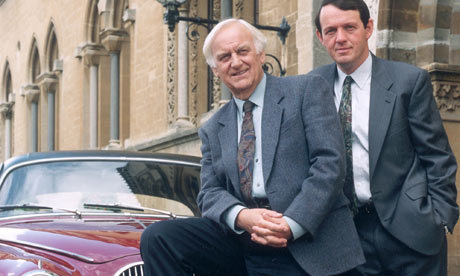
Inspector Morse and junior partner Lewis
Like other detectives who are complicated and interesting, Morse has been portrayed on TV. As a middle-class Englishman, Morse is well aware of the class differences between him and his working class partner Detective Sergeant Lewis, but he doesn’t let that get in the way of a collaborative relationship. Such class differences are seen particularly in English detective novels, another example being Elizabeth George‘s Inspector Lynley series (although George is American.)
Dexter’s novels are complex. He makes use of the third person omniscient point of view and in that manner introduces multiple characters that initially may seem unconnected, or at least unclearly connected. Dexter’s (and Morse’s) genius is to show how the movements and lives of these characters eventually tie together, and how they solve the mystery. Red herrings abound in the Morse novels, so watch for clues that Dexter cleverly plants. Sometimes the text is dense with academic references and language flourishes befitting the Oxford environment, and the style or substance may not suit some readers. However I can tell you that as I came toward the end of an Inspector Morse novel, the moment he realized who the killer was, my own hairs stood on end. Dexter is unquestionably a master at tying up apparently randomly thrown strings into a neat bundle.
The Morse TV series had two spinoffs: one a sequel, Inspector Lewis, set in more contemporary times; the other a prequel, Endeavour. That’s what the initial E in Morse’s name stands for.
To test your own cerebral wits and be eligible to win a box set of the Inspector Darko Dawson series including the fourth novel Gold of Our Fathers due out in Spring 2016, choose the best single answer to the following question:
Livor mortis in forensic pathology is
A. A distinct cherry red color seen in the liver of a murder victim several hours after death.
B. Rigidity of the body after death.
C. Related to gravitational forces.
D. Blanching of the skin of a murder victim found lying prone.
E. Most pronounced in dark-skinned individuals.
August 17, 2015
THE SURVEY RESULTS ARE IN
Thanks for a great response to the survey put out a couple of weeks ago. Here are the results:
Lots of observations can be made about the responses, but the two standouts for me are (1) how positive they are in general (*thanks*); and (2) how many respondents prefer the paper version of my novels to the e-version. Very useful to know . . .
August 2, 2015
DAYS (AND NIGHTS) IN THE LIFE OF A DOCTOR
I’ve been asked if I ever blog about “my other life” as a physician, to which I replied, no. My default is the writing life, but since so many writers are and have been physicians as well, I decided, why not talk about the other half? So in the next couple or so blogs, I’ll offer some stories, observations, vignettes, and maybe even a few “backstage secrets” of the profession.
Exhaustion
This seems like an odd way to start, but I thought I might as well let you know that if on your next appointment with your doctor, he/she seems distant, abrupt or sluggish, there’s a reasonable chance s/he’s exhausted or burned out. Components of burnout in medical practice include loss of interest in one’s work, cynicism, and loss of empathy.

Exhausted surgeon
(Photo: Volt Collection)
Which specialty has the worst hours? One study has vascular surgeons topping the list, but if you have an appointment with a dermatologist, chances are he or she has had an excellent night’s sleep and will be perky and bright. Dermatologists have among the lowest work hours, highest career satisfaction, and highest salaries. Can’t get any better than that. Drats, that’s what I should have gone into. Anyway, in my experience, dermatologists are the best-looking and best-dressed physicians, male and female.
Effects of sleep deprivation on physicians’ performance has been studied to some degree, but I don’t need a study. I can assure you with great confidence that frequent interruption of sleep while on night call as a doctor is like torture. During the years I took call (no longer, thank goodness), I found 3 – 4:30 AM the most treacherous period of the deep night. In that time span, I had a fuzzy brain–slow and fumbling. Physically, I felt like I wasn’t inside my body, but I wasn’t outside either. I couldn’t feel my feet and my skin tingled all over like showers of tiny needless. When I sat down to write the note for the medical record, my eyes would droop, my head would drop as if guillotined, and my hand, holding the pen, would trail off like this.
This would happen multiple times, so imagine how long it took to get through one note. In hospitals and clinics like mine that use the electronic medical record (EMR), the same thing happens only that as you nod off, one of your fingers stays pressed on one letter: agooooooooooooooooo

The folded arms position for a catnap–that’s the one I used
(Photo: wavebreakmedia)
The problem is, whether a resident in training or a physician in private practice, you are under pressure to get to the next patient or patients. In residency training, it is especially urgent because rounds with the attending (senior) physician normally begin at 7 or 8 AM, and by then, everything should be neatly wrapped up–all admissions examined, blood drawn, CT scans done etc. During my training, sometimes I would put my head on the desk as in the image left to take a ten-, twenty-, or thirty-minute nap. It helped, but only marginally. My head was still fuzzy. My body was telling me, You have to get some sleep, and I was telling it, I can’t. Not right now.
Naturally, exhaustion and sleepiness have a detrimental effect on performance, and that can lead to medical errors. Bear in mind that an exhausted physician performing a procedure or surgery may actually go to sleep with his or her eyes wide open. I have had the eerie experience of seeing my patient in front of me talking, but for a second I drift away and realize I didn’t catch the last few seconds of what the patient has said.
For some time, I worked the graveyard shift (7 PM to 7 AM) in an urgent care center After two or three call nights back to back, I can tell you that at 3 AM, I had close to zero empathy for walk-in patients. One Saturday night, a 19-year-old student at an institution that shall remain nameless (starts with U and ends in CLA) came to the urgent care with a deep, blood-gushing laceration in his chin. He had gotten blind drunk and then decided at two o’clock in the morning that he might as well shoot some hoops. Perfectly reasonable. Of course, he lost his balance on the basketball court, fell over and busted open his chin. But here’s the deal: the court’s surface was asphalt. That meant he had several hundreds, if not thousands, of tiny pieces of asphalt in his wound. You cannot suture a wound closed while foreign bodies or contaminants remain within. That meant I had to pick out each asphalt piece one by one, and those that were too deeply embedded had to be cut out. A job that would normally take 30 minutes lasted 2 hours.
Student (slurred): You gonna numb me up before you sew it, right, Doc?
Me (snapping my surgical gloves on): No way.
Student: Aw Doc–why not?
Me: I had to get out of bed at three in the morning for something stupid like this? You don’t deserve any numbing. Sorry.
Student (muttering drowsily): Man, that’s F’d up.
At that point, he lapsed into a deep, snoring, drunken sleep and never felt a thing during the procedure, despite my best intentions. I woke him up when I was done. And it was a beautiful suturing job, if I do say so myself.
That was a relatively harmless circumstance, but exhaustion and lack of sleep can directly affect how a doctor makes his diagnosis, and ultimately, your health and life. One of the reasons why I stopped taking night call, apart from a career shift, was the frightening realization that my very perception of disease could become distorted in those early morning hours between 2 and 5 AM. One particularly distressing story for me is from many years ago when a 49 year old woman who came to the urgent care center complaining of a horrible headache. She had never had anything like this before, and on a 1-10 scale, it was a 12. I gave her a treatment that worked promptly within an hour, and I concluded from that successful trial of medication that she had had a migraine headache. The exhausted part of me gave her a prescription and sent her home. The alert part of me, which was AWOL at the time, knew that an abrupt headache of such intensity in a person who has never had a migraine headache is probably not a migraine.
After my shift and later that day when I woke up from rest, I immediately remembered the woman and intuitively realized that I might have made a terrible mistake. I frantically tried to get a hold of her, but I was too late. A couple of hours after leaving the urgent care, her headache had returned, and she had gone to an emergency room. A head scan showed a brain tumor. The only fortunate aspect of the story was that it wasn’t a hemorrhage, which might have been fatal. Almost every doctor has missed diagnoses–more than they would care to admit–including extremely bright individuals. Physicians become defensive when confronted with their error, often rendering ridiculous rationalizations. In order for medical misdiagnosis to be examined as a problem and reformed, physicians have to start being open about their mistakes.
Having said all this, here are a few tips on how to reduce the likelihood of a medical error being made on you or your loved ones.
If your condition can wait, e.g. a urine infection, upper respiratory infection, strains and sprains, small skin cuts in which bleeding has stopped, minor burns, and so on, avoid going to an urgent care or emergency room in the dead of night, . Wait till your doctor’s office opens up in the morning, or if you don’t have a provider, go to the urgent care around 8 AM, when the day crew generally starts work.
On the other side of the same coin, if an urgent care closes at say, 10 PM, do not for a moment think it’s a good strategy to show up at 9:30 PM “because the place should be emptying out by then.” First of all, it won’t, because everybody else had the same mistaken idea as you, and second, you have caught the staff and providers at a time they are most irritable and all want to go home. Obviously if you have no choice, you must go, but in my experience, closing time is probably the most dangerous hour to go to an urgent care. Avoid it like the plague.
If you can make an appointment with your doctor first thing in the morning, do so. He or she will be relatively fresh at this time, whether or not he or she has taken night call. I don’t ever make an appointment with my own doctors in the afternoon, and I would never choose an appointment at the end of the day. It’s better to negotiate with your employment for a late start at the beginning of the day than an early departure at the end.
Don’t be late to your appointment; in fact, aim to be early, and that way you will arrive on time. Yes, I know it’s unfair: doctors can be late, but patients have to be on time. Until we fix this inequality however, don’t be late, especially at the end of the day. It’s better to cancel if you find yourself stuck in traffic. Doctors and their staff get very annoyed if a patient walks in at 4:30 PM for an appointment that had been scheduled at 4 PM, and they consider it disrespectful. You also get a reputation as a latecomer, which is not good.
If you instinctively feel you’ve been misdiagnosed, get a second opinion.
A word about bedside manner: your doctor may not be the most warm, lovey-dovey person in the world, but if he or she is competent and professional, stick to him or her, and get your touchy-feely stuff elsewhere. One sign of professional behavior: the doctor calls you personally to discuss a lab test or procedure.
Last of all, you don’t need to be afraid, but you do need to be vigilant.
I think that’s enough for this blog. My thanks to Michael Dickens for the idea.
Coming up:
vignettes that will make you gasp, laugh, or shed a tear;
what the hell your prescription actually says; and
the crazy world of medical abbreviations and terminology.
July 29, 2015
DETECTIVES TO REMEMBER (AND ADMIRE)–PART 2
A detective from fiction whom I greatly admire is Kurt Wallander. By now, Wallander and his creator Henning Mankell have both attained legendary standing. Three different actors–two Swedish (Krister Henriksson, Rolf Lassgard) and one British (Kenneth Branagh)–have played Wallander onscreen, testament to the character’s mystique and following.
Wallander lives in the southeast Swedish town of Ystad. Mankell often drapes his scenes with the cold and dark of winter, but in real life, Ystad summers exist and can be lovely.

Ystad, summer. Murder in such a delightful setting? (Photo: blojfo)
I must confess that after seeing the Swedish TV series with Henriksson, I find it unsettling to watch the BBC series, which has characters speaking British English in the middle of Ystad with its Swedish street signs and police vehicles marked Polis.

Street in Ystad (Photo: Pawel Szcepanski)

Swedish police vehicle ( Photo: Tupungato)
Anyone want to have a go at translating the word LEDNINGSFORDON in the above photo?
The clarity of Mankell’s writing style should not be mistaken for simplicity. Rather than showing some parts of the story in real time, he often tells it so that the reader experiences the passage of time in “chunks,” as in this passage from The Fifth Woman in which Mankell describes Wallander and his team working a case:
They continued with the painstaking work. They recorded everything they knew about Eriksson’s life. Svedberg spent long evenings reading carefully through the books of poetry Ericsson had published. In the end, he thought he would go mad if read any more about the spiritual complexities that existed in the world of birds, but he’d gained no insight into Eriksson.
In other words, Mankell chose not to play the scene(s). We don’t know, for instance, how many long evenings Svedberg spent going through Eriksson’s books of poetry. Playing a scene in real time might read something like this:
Two days later, Wallander walked into the office to find Martinsson and Svedberg painstakingly recording everything they knew so far about Eriksson.”I was up until nearly midnight reading Eriksson’s poetry last night,” Svedberg was saying. “I think I’ll go mad if I read anything more about the complexities of birds.”
Does this challenge that well-worn maxim to writers, Show, don’t tell? Maybe, but then Mankell is Mankell. He can do what he wants. It’s part of his style, and his readers like it.
Wallander himself is complicated (I avoid that worn phrase, “complex character.”) Sometimes while on a case, his mind wanders to other things related or unrelated–how his father or daughter is doing–and sometimes the thoughts just pop into his head. I consider this one of the unique aspects of Mankell’s stories and portrayal of the character. Wallander also sleeps poorly and often has vivid and unpleasant dreams. In the novels, he and his team drink liters and liters of coffee–far more than shown on the TV show–probably in keeping with Sweden’s massive consumption of the beverage and the tradition of fika. Wallander also consumes a lot of alcohol, especially when he is brooding or despondent, which happens often and seems to match the long, dark and brutally cold Nordic winters. Mind you, he doesn’t complain about the cold. No true Swede does.
We love Wallander because of his humility and ordinariness in the midst of his brilliance. He has tenacity even as he sometimes wonders about the futility of life and the grisly deaths he investigates.
Next: Inspector Morse

